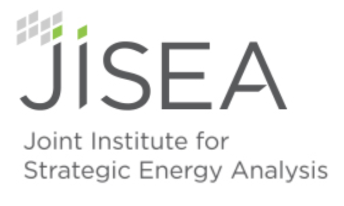The 2022 JISEA Annual Report
April 11, 2022—The 2022 JISEA annual report, released today, highlights the institute's progress over the past year to accelerate the transformation of the global energy economy
"JISEA was founded on the principle of thinking outside the box to create new synergies across systems such as natural gas, nuclear, and renewables and their relationship to land, water, industry, and society," said JISEA Director Jill Engel-Cox, 2018–2022. "You'll read in the annual report how the institute remains committed to that vision today and studied diverse intersections of the energy transition the past year."
This year's report centers on the theme of Empower to reflect the institute's growing work with communities and stakeholders to empower local energy transitions. The report highlights analysis in 2021 across JISEA's key program areas:
- Energy Systems Integration and Transformation: To maximize the value of diverse energy sources, JISEA conducted studies on the potential
for energy-intensive industries to provide grid flexibility; opportunities for a clean,
sustainable power system in the Yucatan Peninsula; actions to enable flexible nuclear
energy; and pathways to net zero using nuclear innovation.
- Advanced Manufacturing and Circular Economy: To ensure resource sustainability in a decarbonized economy, JISEA analyzed how human
behavior could impact the success of end-of-life solar panels, trade and value added
to economies from clean energy manufacturing, and the impacts of increasing demand
on the cobalt supply chain.
- Clean Power for Industry: To establish cleaner industrial processes and advance the transition to a low-carbon
economy, JISEA examined how renewable energy could be integrated into mining operations
and developed a new analytical approach for measuring methane emissions from U.S.
oil and natural gas production.
- Sustainable Communities at the Energy-Water-Food Nexus: To increase the resilience of energy, water, and food systems, JISEA modeled potential benefits of an anaerobic digestor at a Colorado dairy and solar energy in Colorado greenhouses, and advanced studies thus far on floating PV.
Notably, in 2021, JISEA and the National Renewable Energy Laboratory (NREL) launched the JISEA Catalyzers initiative, a highly interdisciplinary program that brings together experts within specific research areas to discuss capabilities, establish best practices, and identify future research needs.
The initiative kicked off with the inaugural Sustainable Communities Catalyzer and the Energy and Atmospheric Systems Catalyzer—both of which stemmed from emerging capabilities at JISEA and NREL and areas of growing importance within the energy transition. "The catalyzers embody JISEA's ability to create forums for discussion among stakeholders who wouldn't otherwise connect," said Juan Torres, associate laboratory director of the Energy Systems Integration directorate at NREL. "The catalyzers are helping to map new collaborations and inform new research capabilities at the laboratory." JISEA will kick off a new Green Computing Catalyzer this spring, exploring pathways to more energy-efficient computing.
Read about all the 2021 JISEA highlights in the annual report.
Back to JISEA News >
